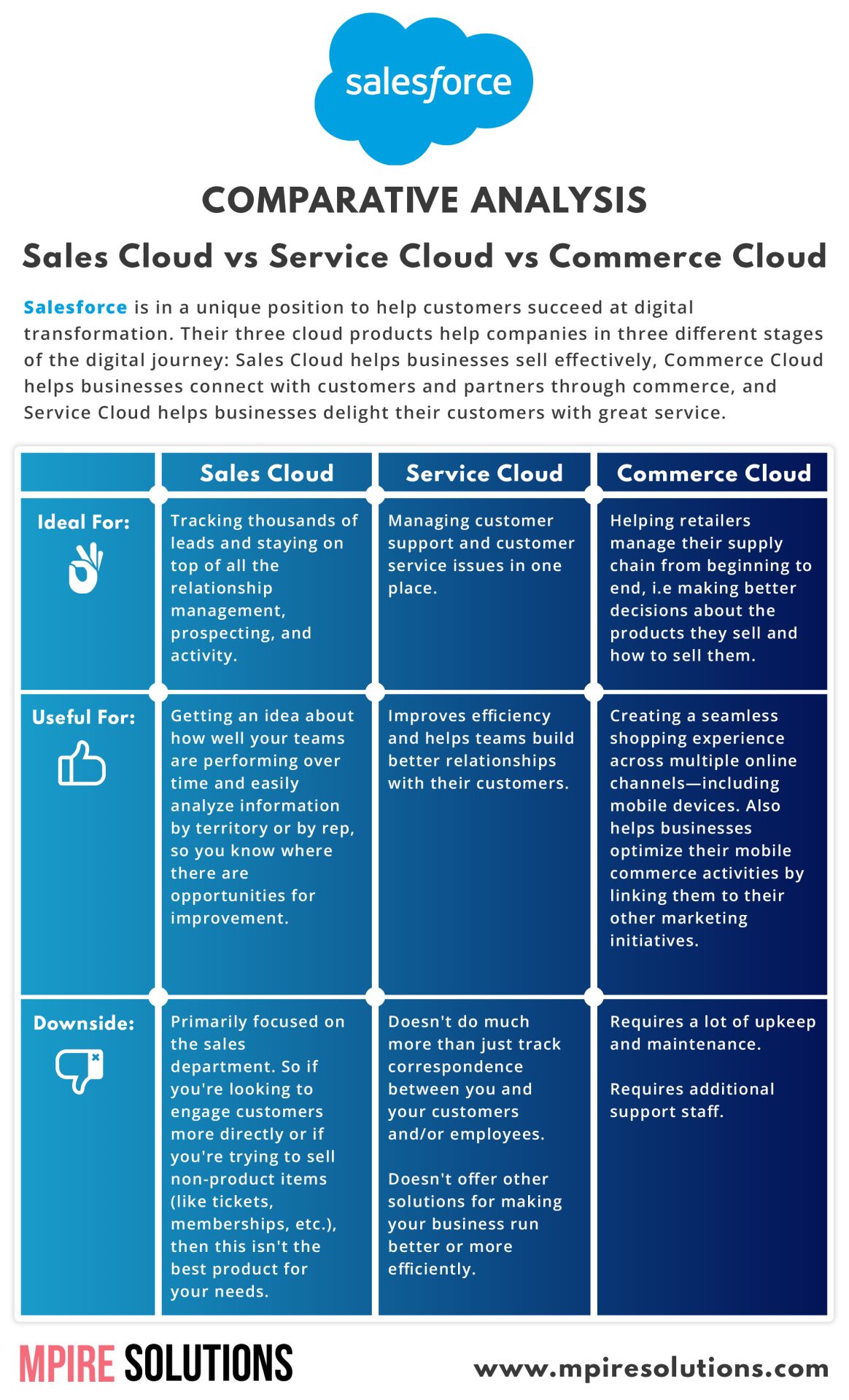Salesforce – Sales Cloud vs Service Cloud vs Commerce Cloud

Introduction
It’s a common question: which Salesforce platform should I use for my company? It’s SO easy to get lost in the jargon and marketing material available on the internet today, but it doesn’t have to be confusing. We are going to tell you everything you need to decide which Salesforce product is right for your business.
Salesforce is the world’s leading CRM platform. It is a popular choice among businesses for managing marketing, sales, service and lately E-commerce activities. While these three clouds are often compared, what is exactly Salesforce Commerce Cloud and how does it differ from Service and Sales Clouds? What are the differences between Sales Cloud, Service Cloud and Commerce Cloud?
Is one better than the other or what should you choose if you’re in the market for any of these types of solutions? It’s time to get rid of the confusion once and for all with the help of this guide.
This blog post covers the following details:
Sales Cloud vs Service Cloud vs Commerce Cloud
About Salesforce Sales Cloud
- Usage
- Benefits
About Salesforce Service Cloud
- Usage
- Benefits
About Salesforce Commerce Cloud
- Usage
- Benefits
Comparative Analysis: Sales Cloud vs Service Cloud vs Commerce Cloud
Conclusion
Salesforce: Sales Cloud vs Service Cloud vs Commerce Cloud
Salesforce Sales Cloud is a CRM (Customer Relationship Management) software for sales teams. It helps salespeople keep track of their leads and customers using features like lead scoring, pipeline reporting, email campaign creation, and customer relationship management.
Salesforce Service Cloud is a suite of software designed to help support teams provide superior customer service by managing their interactions with customers. The service includes product knowledge management tools, customer service automation tools, and knowledge sharing tools.
Salesforce Commerce Cloud is a cloud computing platform that helps businesses of all sizes build, manage, and market their products across all channels. It connects the different systems a company uses to sell and market its products into an integrated solution. Salesforce Commerce Cloud allows you to create personalized customer experiences using data from multiple systems, including your website and social media pages, so that you can offer a seamless experience whether your customer shops online or in-store.
Salesforce Sales Cloud
Salesforce Sales Cloud is a cloud-based service for sales companies that helps track leads, manage accounts, and close deals. It was created by Salesforce, a company that develops commercial cloud computing software. The Sales Cloud tracks which leads are most likely to convert into paying customers and helps salespeople share information with one another. This is accomplished by bringing together the data of multiple teams within a company. Clients can access their accounts and sales leads on their desktops or on mobile devices.
Usage
Sales Cloud is intended for use by sales representatives at corporations who work with multiple clients and need to manage information about each client in a central place. Sales reps who sell software or other products to businesses can take advantage of the many features of Sales Cloud, such as the opportunity to record details about each meeting separately and track all interactions with clients on a daily basis.
Sales Cloud is integrated with other cloud-based applications provided by Salesforce, such as Service Cloud, which enables customer service representatives to track inquiries and support requests, and Community Cloud, which lets online communities share articles and discuss relevant topics.
Benefits
Salesforce Sales Cloud is a powerful and versatile sales-performance management tool that can help close the gap between your sales goals and your actual results. A Salesforce sales cloud review will reveal the multitude of benefits associated with this extremely useful platform, including (but not limited to):
- Automated data collection
- Analytics, insights, and reporting capabilities
- Updated records in real time
Its features are designed to ensure that you have access to all relevant information at every stage of the sales process, so you can make more informed decisions regarding how to proceed with each potential sale. This means it can be used for a wide variety of tasks and will be particularly attractive to those who need a comprehensive solution that captures all the information related to their sales activity.
Salesforce Service Cloud
Salesforce Service Cloud is a cloud-based offering that offers companies a flexible, scalable, and secure platform for managing their customer relationship management.
As you know, most CRM systems are available on-premises only. This means they’re limited by the size of the company’s IT department and other resources. Salesforce Service Cloud eliminates these limitations by providing a cloud-based CRM solution with powerful features that make it easy for small businesses and midsize organizations to use the same software found in larger Fortune 500 companies:
- Unlimited users
- Unlimited contacts
- Real-time synchronization of all contact data across devices
- Full access to Salesforce analytics
- Customizable dashboards, email templates, and alerts
- Workflows that manage interactions between members of your team and your customers
This means that you can easily manage customer relationships across multiple teams, departments, or regions as well as create marketing campaigns based on your unique business needs.
In short, Salesforce Service Cloud offers advanced tools for companies to communicate with their customers in a direct, personal way, so that the customer always feels like they’re getting first-class treatment.
Usage
The Salesforce Service Cloud is used by small- to medium-sized businesses that need help with customer support and management. It’s also great for companies that provide cloud computing solutions or software as a service (SaaS). It allows them to track and monitor issues, manage contract renewals, and reduce service costs. Businesses can also use Service Cloud to create contracts, configure services, set up support plans, and organize their customer data.
The platform offers customizable workflows and gadgets that lets companies monitor customer interactions from every angle and get more visibility into their internal processes. This helps companies organize teams more effectively, track progress on projects, and collaborate on tasks more seamlessly across departments.
Another benefit of the Salesforce Service Cloud is the reporting capabilities. These capabilities allow you to customize reports based on your business needs and track performance against goals. This will help you increase efficiency while increasing revenue stream opportunities.
Benefits
The Salesforce Service Cloud lets businesses manage their customer relationships better, including the ability to monitor conversations and create personalized interactions. This means that businesses can provide even better service to their customers, making it easier for them to reach out when they need help, while also allowing the firms to be more proactive in providing assistance.
Here’s a list of some main benefits that you can utilize with Salesforce Service Cloud:
Service cases and service requests
- Lead management
- Escalation management
- Customer satisfaction tracking
- Answer customer questions faster and more efficiently
- Create better deliverables for clients
- Make sure all your customer service efforts are aligned with corporate goals
With Salesforce Service Cloud, you also have a better chance at gaining insights into your customers’ behaviors, enabling you to create additional opportunities and upsell products.
Salesforce Commerce Cloud
Salesforce Commerce Cloud is a cloud-based commerce platform that makes it easy to create and manage omnichannel sales experiences. The platform enables brands to sell anywhere, on any channel, with personalized customer experiences and real-time analytics. Salesforce Commerce Cloud is built on the world’s #1 CRM – Salesforce1 – so you have a complete view of every customer that matters.
The platform helps you manage the physical products your customers are buying, including how they’re shipped, stored, and distributed. It’s important to have all of this covered because it’s a lot more complicated than just selling books or music online—you need to worry about how those things are packaged and shipped and then whether they get there on time. You need to make sure the right people are handling all of these things, too.
Salesforce Commerce Cloud takes care of all these details for you, so you can focus on creating an amazing product and your customers can focus on being happy with the one you’re selling them. And as always with Salesforce, it works across all devices.
Usage
This cloud computing solution is designed to make it easier for businesses of all sizes to provide flexible, high quality commerce experiences across multiple sales channels. It helps companies enhance their E-commerce capabilities, provide personalized shopping experiences on any device, and create targeted marketing campaigns.
Salesforce Commerce Cloud for Retail, which offers a cloud-based solution for retailers that enables them to manage multiple sales channels (e.g., web, mobile), leverage advanced analytics, and deliver personalized customer experiences across all touch points.
Salesforce Commerce Cloud for Marketing, a platform that gives marketers the tools they need to create relevant and timely customer experiences across channels. This includes solutions for digital commerce, social commerce, and loyalty marketing.
Salesforce Commerce Cloud for Developers, which provides developers with the tools and resources needed to build integrations between Salesforce and external applications in order to automate business processes and streamline operations.
Benefits
It’s called Salesforce Commerce Cloud for a reason: it’s meant to make commerce better. We know that if you’re going to be successful in this digital world, you need all your sales, marketing, and commerce processes to work together seamlessly.
That’s why Salesforce has built this platform using the same infrastructure that supports some of the biggest names in retail: Walmart, Gap, Sears, eBay, and more. Now you can integrate your commerce and marketing functions into one platform to achieve better results.
The benefits of using Salesforce Commerce Cloud are:
- It makes shopping easy for consumers and profitable for retailers.
- Organizations across industries can easily manage their digital channels to better serve customers and increase revenue.
- It connects businesses with consumers on any device at any time.
- It’s easy to integrate into your existing infrastructure, so you can start boosting sales right away.
- And because it’s built on top of Salesforce, it’s incredibly affordable compared with other options on the market today.
And here’s the best part: You don’t have to be a huge e-commerce site like Amazon or eBay to take advantage of this platform. In fact, many customers are small businesses with unique needs. What they all have in common is their desire to succeed in this high-stakes digital landscape.

Conclusion
So, to sum up, Salesforce Commerce Cloud provides a centralized place for developing and selling E-commerce capabilities, Service Cloud is designed for service-related workflows, and Salesforce’s mainline business software, Sales Cloud is the company’s platform for data, analytics, lead management and other sales functionality. The biggest differences between these three tracks are the type of customers and industry verticals, and their needs.
Looking for the best Salesforce solutions? We at MpireSolutions are dedicated to offering customized, personalized solutions that are specific to your needs, allowing us to give you exactly what you want instead of leaving you with a one-size-fits-all option.
Our expertly-designed solutions combine business insights, advanced analytics, and data management technologies to create a next-generation platform that supports the entire process of making business decisions and improving performance.




